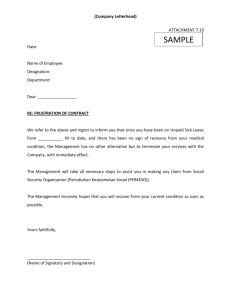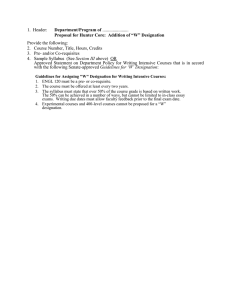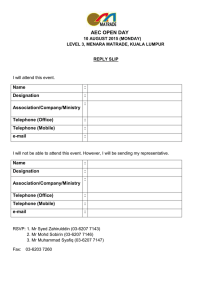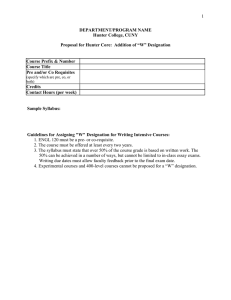Relationship between trademarks and other means of individualiza
advertisement
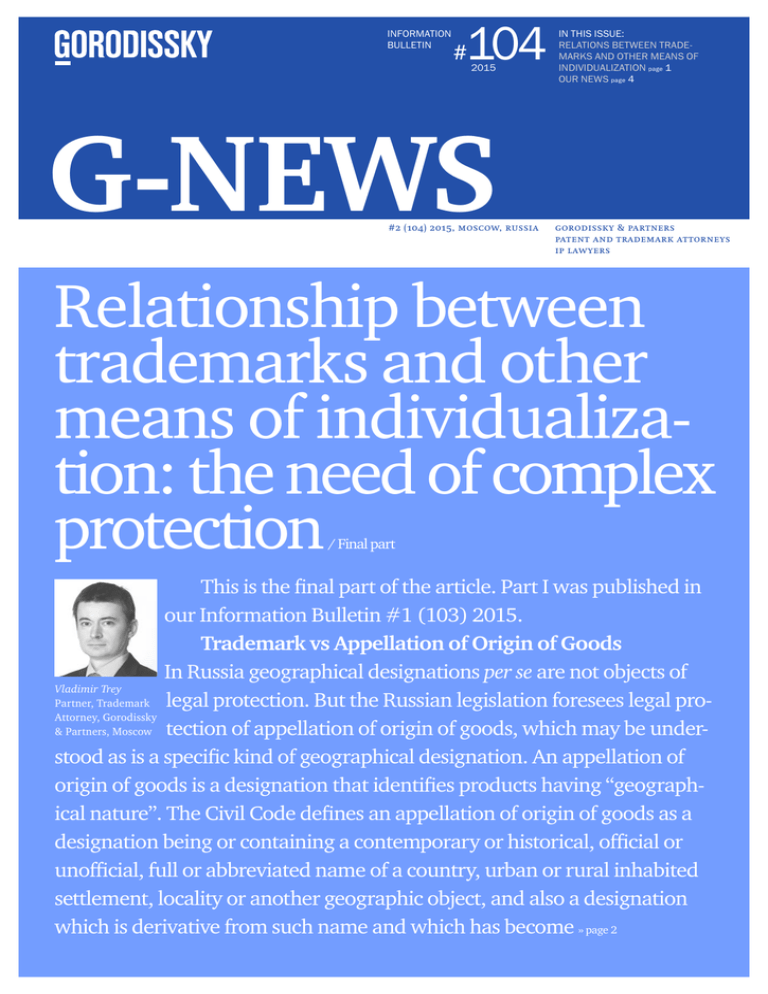
INFORMATION BULLETIN 104 # 2015 G-NEWS #2 (104) 2015, moscow, russia IN THIS ISSUE: RELATIONS BETWEEN TRADEMARKS AND OTHER MEANS OF INDIVIDUALIZATION page 1 OUR NEWS page 4 gorodissky & partners patent and trademark attorneys i p lawyers Relationship between trademarks and other means of individualization: the need of complex protection / Final part This is the final part of the article. Part I was published in our Information Bulletin #1 (103) 2015. Trademark vs Appellation of Origin of Goods In Russia geographical designations per se are not objects of Vladimir Trey Partner, Trademark legal protection. But the Russian legislation foresees legal proAttorney, Gorodissky & Partners, Moscow tection of appellation of origin of goods, which may be understood as is a specific kind of geographical designation. An appellation of origin of goods is a designation that identifies products having “geographical nature”. The Civil Code defines an appellation of origin of goods as a designation being or containing a contemporary or historical, official or unofficial, full or abbreviated name of a country, urban or rural inhabited settlement, locality or another geographic object, and also a designation which is derivative from such name and which has become » page 2 gorodissky & partners patent and trademark attorneys i p lawyers page – recognized as the result of being used in respect of merchandise whose special properties are exclusively or predominantly defined by the natural conditions and/or human factors characteristic of the given geographic object. The manufacturers of such merchandise may be recognized to own the exclusive right to use the appellation of origin. At that a designation being or containing a name of a geographic object that is generally used in the Russian Federation as a designation of goods of a certain kind but not relating to the place where manufactured shall not be deemed an appellation of origin. An appellation of origin of goods is used on products that have a specific quality that is exclusively or essentially due to the geographic environment in which the products are produced. An appellation of origin of goods shows that a product is produced in a certain region and has certain characteristics. Trademarks and appellations of origin of goods have both differences and points of contact. A trademark is a designation used by an entity to distinguish its goods and services from those of other legal entities. It provides its owner with the possibility of preventing others from using the identical or similar trademark for similar goods. To the contrary the same appellation of origin of goods may be used by different producers from the same region, whose products have same typical qualities. Point 7 of Article 1483 of the Civil Code forbids registration as trademarks of designations which are identical or similar to the extent of confusion to appellations of origin of goods. However, an appellation of origin of goods may be incorporated into a trademark as a non-protectable element under condition that the application for the trademark is filed for the same goods, for which the appellation of origin of goods has been registered, and the applicant has the right to use this appellation of origin. Otherwise, an appellation of origin of goods may form an obstacle to trademark registration, which may be recognized to be misleading. In practice it is hardly possible to eliminate a risk of a conflict between a trademark and an appellation of origin of It is worth mentioning that possible collisions between trademarks and appellations of origin of goods are still subject of discussion and further legislative initiatives since in some situations coexistence of these IP objects might be quite complicated. Trademark vs Commercial Designation According to the Russian legislation rights for a trademark appear from the moment of its state registration. No rights derive from the use an unregistered trademark. But since January 2008 when Part IV of the Russian Civil Code came into force a new subject matter of intellectual property appeared, in particular the so called “commercial designation”. It is rather close to a trademark by its nature but the right for this subject matter arise without its obligatory registration before an administrative body such as the Russian Patent and Trademark Office. In accordance with stipulations of the Russian Civil Code for individualization of one or several trade, industrial or other enterprises legal entities and individual entrepreneurs may use one or more commercial designations that are not firm names and are not subject to obligatory inclusion in the company’s founding documents nor in the state register of legal entities. In view of the definition of the commercial designation mentioned in Part IV of the Civil Code this subject matter is to some extend broader as compared with a firm name as not only word designations may be used as commercial designations but also devices, colors and color designations etc. Moreover, if we compare a firm name and a commercial designation, these two subject matters are basically different from the point of view of their function since a firm name is used to identify a company in relations with state bodies or other firms and contractors but a commercial designation is used to identify an enterprise in relations with customers. A commercial designation may be used on signs, letterheads, invoices and other documentation, in announcements, in advertising, as well as on goods and their packaging. Protectability requirements for a commercial designation are the capability of distinguishing and the use for individualization of the right holder’s enterprise within the frontier of a specific territory. Different kinds of commercial designations may be used by entrepreneurs while conducting their business activities. These could be for example names of shops or enterprises of domestic services, names of restaurants and cafeterias or hotels and clubs, emblems, names of means of transport such as ships, airplanes or trains etc. The Civil Code limits the use of a commercial designation to some extent, in particular, the use of a commercial designation is not allowed if it is capable of misleading in connection with the possession of an enterprise by a particular person. Thus a commercial designation may not be similar to the extent of confusion with a firm name, a trademark, or another commercial designation belonging to another person if the exclusive rights for the mentioned subject matters arose earlier. Violation of this rule involves termination of use of the commercial designation and compensation the right holder’s damages on demand of the right holder. The exclusive right for a commercial designation may pass to another person for example by contract, by way of universal legal succession and by other means. But the condition of transfer of right for a commercial designation is that it passes to another entity in composition of an enterprise for the individualization of which such designation is used. An appellation of origin of goods is used on products that have a specific quality that is exclusively or essentially due to the geographic environment in which the products are produced. goods. To some extent it is possible to forecast such a conflict, if before filing a trademark application the applicant conducts a clearance search covering protected appellations of origin of goods. However, such a search as well as possible trademark registration could not guarantee that the same or similar appellation of origin of goods would not be protected in future. Collisions between trademarks and appellations of origin of goods are quite rare. An example of such a collision is the case on the basis the appellation of origin of goods “Slavyanovskaya” (mineral water) against the trademark “Slavyanovskaya” that resulted in invalidation of the trademark. A dispute around the name “Sarova” (mineral water) has become an endless story and the decisions of authorities in that case were diligently appealed by the parties in various instances with varying success. 2 gorodissky & partners patent and trademark attorneys i p lawyers page – The Civil Code also stipulates the territory of validity of the right for a commercial designation which is limited by the borders of the Russian Federation only. The term of validity of the right for a commercial designation is stipulated by the Civil Code as well, in particular, the exclusive right to a commercial designation shall be terminated if the right holder does not use it continuously within one year. Nonetheless, the current legislation does not contain any provisions as to from which date the mentioned one-year period must be counted and who may initiate the proceeding of termination of the right for a commercial designation and whether initiating of such proceeding is necessary at all or the right expires automatically. The right for a commercial designation is independent from the exclusive right to a firm name or a trademark, but a commercial designation or individual elements of this designation may be used by the right holder in a trademark belonging to him. Reverting to the principle of the senior right it is necessary to mention that this concerns commercial designations as well. In accordance with the provisions of the Russian Civil Code a commercial designation may constitute a basis for opposing a trademark registration. According to Point 8 of Article 1483 of the Russian Civil Code “with respect to goods of the same type, designations may not be registered as trademarks if they are the same as, or similar to the point of confusion with, to a firm name or commercial designation (or individual elements of such a name or designation) registered in the Russian Federation, … rights to which arose in the Russian Federation for other persons earlier than the priority date of the trademark undergoing registration”. The invalidation action must be filed with the Russian PTO whereas there is no deadline for initiating such proceedings as compared with the invalidation proceedings based on a prior trademark, i.e. the invalidation actions based on a commercial designation may be initiated within the whole period of validity of a challenged trademark registration. During the recent years some practice of enforcement of commercial designations has developed. There were several cases where commercial designations based a background for invalidations actions or court disputes, for example, in the case initiated by Private Secondary School “Stupeni” (Moscow, Russia) against the trademark registration “Moscow Lyceum “Stupeni” in the name of Moscow Lyceum “Stupeni” (Moscow, Russia). One of the reasons for invalidation proceedings was the fact that the challenged trademark represented a part of the firm name and a commercial designation of the claimant. The Russian PTO did not satisfy the claims but the decision was further appealed and the appeal decision was positive for the claimant. Nonetheless, the appeal decision was then successfully disputed by the trademark owner and the trademark was left in force. However, it seems that the claimant has not exhausted all possible arguments and may start another round of invalidation proceedings. In order to start any proceedings based on a commercial designation it is necessary to determine on the basis of which facts the rights for the designation appeared. The basis for the rights for a commercial designation is its first commercial use and the evidence of such use could be considered as a confirmation that someone has rights for a particular commercial designation. Therefore it is reasonable to submit some financial documentation, agreements, advertising information, samples of products or their packaging bearing the commercial designation in question. At that it is necessary to prove that the commercial designation is known among consumers within the borders of a particular territory what seems to be quite difficult whilst the legislation does not stipulate any criteria for evidencing the fact that a commercial designation is known among the consumers. 3 Another issue that remains somewhat undecided and raises a lot of questions is distinctiveness of a commercial designation, in particular, if the approach to a commercial designation should be different from that applied to trademarks. Presumably the criteria of distinctiveness should be different as the rights for a commercial designation appear on the basis of its use in commerce, what means that the public and consumers are already aware of the designation used as a commercial designation and it is perceived as a means of individualization of a particular entrepreneur so it acquires distinctiveness based on the use within the borders of a specific territory. The Civil Code does not allow the use of commercial designations which may mislead the public in respect of the ownership of an enterprise by a particular person. Such confusion may arise if the commercial designation in question is similar to the extent of confusion with a firm name, a trademark or another commercial designation. Nevertheless, again the legislation does not contain any references to the criteria of similarity. In case of necessity to argue that a commercial designation is confusingly similar to a firm name, a trademark or commercial designation, the claimant could make use of the existing Rules of consideration of trademark applications which stipulate that the applied trademarks are examined by the Russian PTO with the purpose of revealing prior identical or similar applications and registrations. The mentioned Rules are used by the examiners of the Russian PTO while conducting examination on relative grounds for refusal of a trademark application and indicate that the criteria for considering trademarks similar are phonetics, visual appearance and semantic meaning of the compared designations. An example of successful enforcement is a case considered by the Chamber of Patent Disputes of the Russian PTO where the owner of the commercial designation “Matrasson” in Cyrillic managed to confirm his rights therein and successfully cancelled the identical trademark registration for the designation “MATRASSON” in Cyrillic for the goods similar to those in respect of which the commercial designation had been used before the date of application of the contested mark. Inclusion of commercial designations to the existing legislation is a quite disputable decision. On the one hand the legal protection of commercial designations corresponds with the international practice and it exists in many jurisdictions. On the other hand the presence of such a legal category in the current legislation might cause a number of legal disputes and collisions with other subject matters of intellectual property such as registered trademarks and firm names. At this stage enforcing a designation which is individualizing a product in Russia could be easier if this designation was registered as a trademark. Obtaining certificate of trademark registration increases the force of the designation used to identify the products of services. A trademark registration may also strengthen the positions of the right holder in a dispute since if the claimant relies only on a firm name or a commercial designation, it could be difficult or even impossible for the claimant to submit sufficient evidence that he owns the rights for the respective means of individualization (for instance, in such a situation when the claimant is a non-commercial organization or if documents relating to the start of use of the commercial designation cannot be located etc.) and might be unable to protect them. Nonetheless, the right holder should remember that a trademark registration might be vulnerable to invalidation on the basis of other means of individualization and therefore obtaining a complex protection for the means of individualization is recommendable. information bulletin | #2 (104) 2015, moscow, russia page – Events (conferences, seminars, news) 19.03.2015 // MOSCOW Sergey Medvedev, PhD, LLM, Senior lawyer (Gorodissky & Partners, Moscow), spoke on “IP deals: legal and practical issues” at the XV Jubilee IP Forum, held by the company Infor-media Russia at the Hotel Mercure Moscow Paveletskaya. Sergey focused on the major amendments in the IP legislation regarding disposal of exclusive rights on different IP objects and the practice of making IP deals. 11.03.2015 // YOSHKAR OLA Sergey Dudushkin, Senior partner, Patent attorney, Vladimir Biriulin, Partner, Head of Legal practice, Tatiana Pogrebinskaya, PhD, Trademark attorney, Natalia Radchenko, PhD, Trademark attorney, Counsel (all from Gorodissky & Partners, Moscow), gave consultations on “Legal look on trademarks” hosted by the Ministry of economic development and commerce of the Mariy El Republic for industrial executives, lawyers, marketing experts, etc. 10-11.03.2015//LONDON Irina Chadina and Evgeny Monakhov, Patent Attorneys (both from Gorodissky & Partners, Moscow), and Dmitry Yakovlev, Patent Attorney (Gorodissky &Partners, St.Petersburg), attended the International Patent Forum hosted by Managing Intellectual Property where they took part in consideration of topic issues of patenting, court practice, commercialization and valuation of intellectual property in Europe, USA, Russia, China, Turkey, India and other countries. Monakhov with the trophy 197046, ST. PETERSBURG, RUSSIA Kamennoostrovsky prosp., 1/ 3, of. 30 Phone: +7(812) 327-50-56 Fax: +7(812) 324-74-65 e-mail: spb@gorodissky.ru After the Forum the Managing IP Global Awards ceremony 2015 took place. The leading law and patent firms from the major jurisdictions around the world were awarded for the most innovative and challenging IP work of the past year. Gorodissky & Partners received the Russia IP Firm of the Year award! 3.03.2015 // MOSCOW Natalia Stepanova, Partner, Chief lawyer (Gorodissky & Partners, Moscow), took part at the Round table “Ambush marketing: main symptoms and methods of controlling” hosted by ICC in Russia. Ludmila Novosiolova, IP Court, Nikolay Kartashov, Federal Anti-monopoly Service, officials from the Russian PTO, Organizing Committee of the XXII Winter Olympic games and the XI Winter Par-Olympic games 2014 spoke on issues of protection of competition in the context of ambush marketing and suppression of unfair competition. 2-3.03.2015 // MOSCOW Valery Narezhny, PhD, Counsel, and Sergey Medvedev, PhD, LLM, Senior lawyer (both from Gorodissky & Partners, Moscow), spoke at the seminar “Rights for results of intellectual activity : Turnover and Protection” hosted by IRSOT, Moscow, the educational institution of modern technologies – for lawyers, tax consultants and accountants. The presentations covered both – general and specific – aspects of legal regulation and practice of conclusion of different IP agreements in Russia as well as IP taxation. The presentations were supported by numerous practical cases, including those from the speakers’ practice. Photo: Dmitry Yakovlev, Irina Chadina and Evgeny 129090, MOSCOW, RUSSIA B. Spasskaya str., 25, bldg. 3 Phone: +7(495) 937-61-16 / 61-09 Fax: +7(495) 937-61-04 / 61-23 e-mail: pat@gorodissky.ru www.gorodissky.com 4 15-18.02.2015 // LAS VEGAS Sergey Medvedev, PhD, LLM, Senior Lawyer (Gorodissky & Partners, Moscow), attended the 55th Annual IFA Conference. Certain legal and economic issues relating to concluding and enforcing franchise deals such as rights/liabilities of right holders and users of agreements, brand management and brand protection in social media, negotiations within the deal, franchise dispute resolution etc. were considered at the Conference. Special attention was paid to different business aspects of international franchising. 350000, KRASNODAR, RUSSIA Krasnoarmeiskaya str., 91 Phone: +7(861) 210-08-66 Fax: +7(861) 210-08-65 e-mail: krasnodar@gorodissky.ru 607328, SAROV TECHNOPARK, RUSSIA N.Novgorod region, Diveevo, Satis Parkovaya str., 1, bldg. 3, office 14 Phone / Fax: +7 (83130) 67475 e-mail: sarov@gorodissky.ru 614000, PERM, RUSSIA Petropavlovskaya str, 41, of. 215 Phone: +7(342) 259-54-39 Fax: +7(342) 259-54-38 e-mail: perm@gorodissky.ru 620026, EKATERINBURG, RUSSIA Rosa Luxemburg str., 49 Phone: +7 (343)351-13-83 Fax: +7 (343)351-13-84 e-mail: ekaterinburg@gorodissky.ru 443096, SAMARA, RUSSIA Ossipenko str., 11, offices 410-412 Phone: +7(846) 270-26-12 Fax: +7(846) 270-26-13 e-mail: samara@gorodissky.ru 603000, N. NOVGOROD, RUSSIA Il’inskaya str., 105A Phone: +7(831) 430-73-39 Fax: +7(831) 411-55-60 e-mail: nnovgorod@gorodissky.ru 420015, KAZAN, RUSSIA Zhukovskogo str., 26 Phone: +7 (843) 236-32-32 Fax: +7 (843) 237-92-16 e-mail: kazan@gorodissky.ru 01135, KIEV, UKRAINE V. Chornovola str., 25, office 3 Phone: +380(44) 278 49 58 Fax: +380(44) 503 37 99 e-mail: office@gorodissky.ua www.gorodissky.ua
